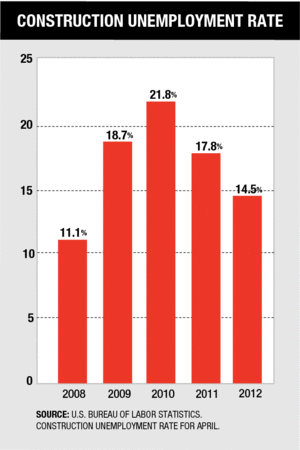
Construction Industry's Unemployment Rate Declining
Construction's unemployment rate dropped sharply in April, to 14.5% from 17.2% in March, although the industry shed 2,000 jobs. Last month's construction jobless rate also was far below the April 2011 level of 17.8%, continuing a long string of year-over-year declines. The Bureau of Labor Statistics' latest monthly report on employment trends, released on May 4, showed the job losses last month in construction's buildings and non-residential specialty-trades sectors outweighed the gains in the heavy-civil and residential specialty-trades segments. Architectural and engineering services added 7,400 jobs in April.
GAO Faults Federal Oversight Of Nuke-Plant Shutdown Funds
The U.S. Nuclear Regulatory Commission may be underestimating the cost of decommissioning nuclear powerplants and failing to make sure facility owners are preparing financially for the plants' permanent shutdown, the U.S. Government Accountability Office says in a report released on May 7. GAO says a formula used by NRC to estimate decommissioning costs considers the "bulk" of funds needed for the work but does not specify what the term means. The report compares NRC's formula estimates for 12 reactors with the plants' own detailed estimates and found the agency's numbers fell substantially short of the latter in a number of instances. The funding formula is based on 30-year-old information, says GAO, but the agency says NRC is determining "whether it should be updated."
Granite Pulls Out of Oregon Job
Granite Construction Co., Watsonville, Calif., has finally pulled the plug on its $217-million project to upgrade Oregon's coastal highway U.S. 20. The Oregon Dept. of Transportation has reached an agreement with Granite's subsidiary, Yaquina River Constructors, to terminate its design-build contract. The project ran into problems when Yaquina's newly constructed bridge bents shifted in the landslide-prone area. Work stopped at four bridge locations in February 2010, even as work on the rest of the project was completed. Under the agreement, Yaquina will demobilize from the project, both parties will waive claims against each other, a notice of default will be rescinded, and Yaquina will pay ODOT $15 million. ODOT will rebid work for the remaining, redesigned portion of the job.
New York Must Spend Billions To Replace 4,700 Miles of Line
New York state must spend $25 billion over the next 30 years to replace 4,700 miles of power transmission line, says a long-range study released on April 30 by six major state utilities. The report identified about $2.5 billion in specific upgrades that could boost power-grid capacity, provide economic benefits, support existing renewable projects and make the system more robust, the study says. The report is phase two of a statewide reliability study by the utilities. "Rather than each company replacing their individual assets to maintain reliability, we're looking collectively at where it makes sense to coordinate upgrading or expanding those assets," says James Laurito, president of Central Hudson Gas & Electric, Poughkeepsie, and chairman of the statewide coalition of transmission owners. The study says transmission bottlenecks cost consumers $1.1 billion in 2010.
U.S.-Israeli Venture Will Build Israel's Largest Solar Plant
Israel has signed an agreement with a U.S.-Israeli joint venture to build the country's largest photovoltaic powerplant, a 30-MW facility to be located in the Negev Desert. Belmont, Calif.-based SunEdison LLC and Tel Aviv-based Clal Sun will build the project, estimated to cost $50 million, and sell power to the state-owned Israel Electric Corp. The company is set to finalize financing within 12 months and complete construction by 2015. Officials say the facility, along with two 110-MW solar thermal powerplants, will enable Israel to reach its 10% target of power from renewable sources by 2020. Coal produces more than 60% of the country's electricity, but a switch to natural gas is under way following the discovery of offshore reserves.
Denver Job Goes Below-Grade
The Colorado Dept. of Transportation has changed its plan to rebuild a mile-long section of I-70 through north Denver to a below-grade roadway. The new plan would replace the deteriorating six-lane I-70 East viaduct and route the freeway through a 30-ft open cut. The new roadway will have five lanes in each direction as well as an 800-ft-long cap section to create a park. The plan would add an estimated $150 million to the $1 billion already targeted for the project. Further, the scheme would require the city to buy and raze 87 homes.

Post a comment to this article
Report Abusive Comment